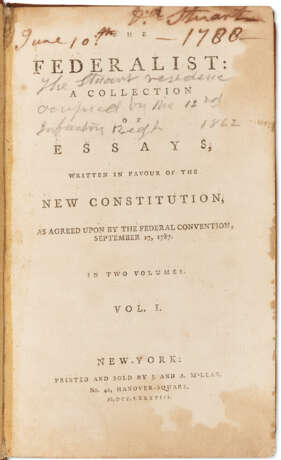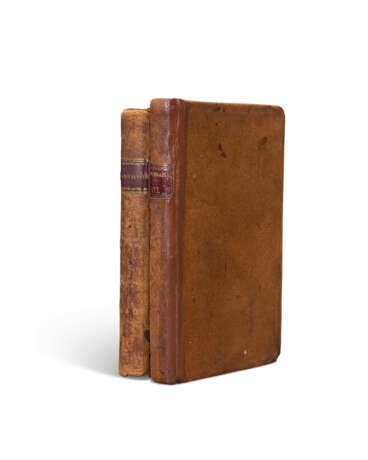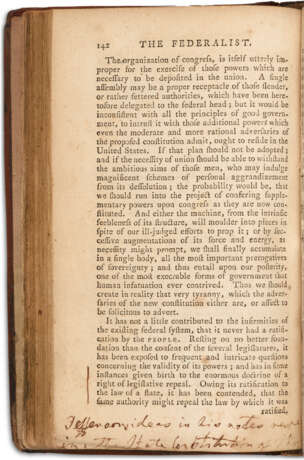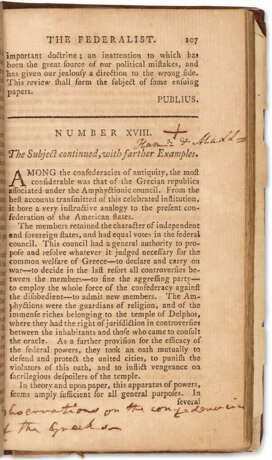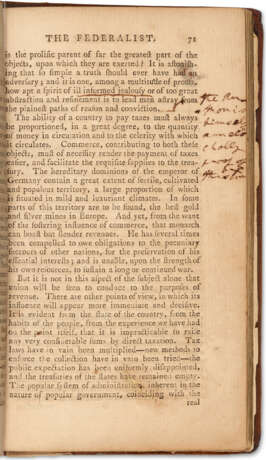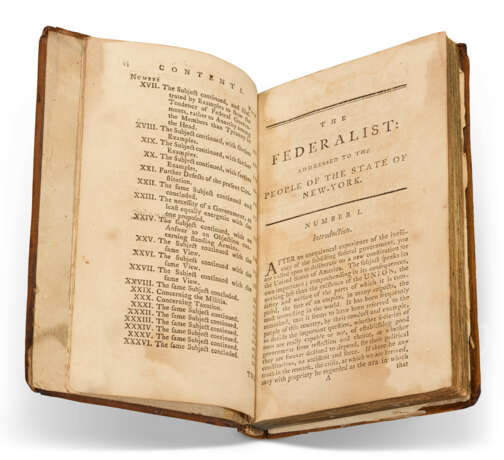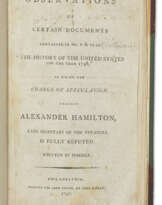ID 1236371
Lot 140 | The Federalist
Estimate value
$ 250 000 – 350 000
An important Washington family copy of the first edition, bearing the 1788 ownership signature and handwritten annotations of Dr. David Stuart, Washington's relation and political confidante who helped publish the essays in support of the Constitution in the Virginia press and found in the first volume of a nearly uniform set. This series of essays is "justly recognized as a classic exposition of the principles of republican government" (R.B. Bernstein, Are We to be a Nation? The Making of the Constitution, 1987, p.242). The Federalist Papers grew out of the heated pamphlet wars and tumultuous debate over ratification of the Constitution. Concerned that the state of New York might refuse to ratify, Hamilton enlisted John Jay and James Madison to collaborate on a series of interpretive essays supporting the new plan of government and refuting point-by-point the objections of its many detractors. "Hamilton wrote the first piece in October 1787 on a sloop returning from Albany... He finished many pieces while the printer waited in a hall for the completed copy" (R. Brookhiser, Alexander Hamilton: American, 1999, pp.68-69). Due to Jay's illness and Madison's return to Virginia, the bulk of the 85 essays, in the end, were written by Hamilton. "Despite the hurried pace at which they worked—they ground out four articles nearly every week—what began as a propaganda tract, aimed only at winning the election for delegates to New York's state ratifying convention, evolved into the classic commentary upon the American Federal system" (F. McDonald, Alexander Hamilton, p.107). Washington, the former President of the Constitutional Convention, precisely spelled out the work's importance when he wrote that The Federalist "will merit the Notice of Posterity; because in it are candidly and ably discussed the principles of freedom and the topics of government, which will always be interesting to mankind."
Dr. David Stuart (1753-1814), who married Eleanor Calvert Custis, the widow of Martha's son, John Parke Custis, in 1783, soon became an intimate confidant of George Washington and his family. (Following Washington's death, Martha relied on Dr. Stuart to manage her affairs.) Apart from frequent family visits , Stuart and Washington enjoyed a healthy correspondence, touching on matters ranging from finance to sensitive political issues including the establishment of the District of Columbia that would become the seat of government in 1800. During the debate over the ratification of the Constitution, Washington, desiring to maintain a low profile, enlisted Stuart to submit the essays in support of the Constitution secretly on his behalf. On 30 November 1787, Washington wrote to Stuart, expressing his worry that nothing supportive of ratification had yet to appear in the press, finding rather, "That there are some writers (and others perhaps who may not have written) who wish to see these States divided into several confederacies is pretty evident." Washington then offered, "As an antidote to these opinions, and in order to investigate the ground of objections to the Constitution which is submitted to the People, the Federalist, under the signature of Publius, is written. The numbers which have been published, I send you. If there is a Printer in Richmond who is really well disposed to support the New Constitution he would do well to give them a place in his Paper. They are (I think I may venture to say) written by able men; and before they are finished, will, if I am mistaken not, place matters in a true point of light. Altho’ I am acquainted with some of the writers who are concerned in this work, I am not at liberty to disclose their names, nor would I have it known that they are sent by me to you for promulgation.” With that letter, Washington sent the first seven numbers of the Federalist to Stuart for republication in Richmond where the first three appeared in print in the Virginia Independent Chronicle on 12, 19 and 26 December. On 22 December, Washington sent additional numbers under the signature Publius. (George Washington to David Stuart 30 November 1787, Papers of George Washington, Vol. 5, 466; James Madison to George Washington, 18 November 1787, Ibid, Vol. 5, p. 444, fn. 2; George Washington to David Stuart, 22 December 1787, Ibid, Vol. 5, p. 501.).
Stuart's marginalia reveals a close reading of the text. He even takes time to identify the various authors noting Jay's authorship of Number 3, as well as "Mr. Madison as the writer of Number 10, where, on page 54, he appears to draw a parallel to British politics besides Madison's definition of "faction" as "a number of citizens … who are untied and actuated by some common impulse of passion, or of interest, adverse to the rights of other citizens, or to the permeant and aggregate interests of the community." Stuart appears to have written: "[B]ritish to have envise[d] [s]uch a [fac]tion." In Federalist No. 11, Stuart offers two comments on Hamilton's exposition on the importance on the need for a navy to protect American commerce. The first is in reference to Hamilton's assertion that even a small Navy, although likely unable to "vie with those of the great maritime powers, would at least be of respectable weight if thrown into the scale of either of the two contending parties." Here Stuart makes reference to a similar point made by James Madison, and likely citing comments made by Madison in Federalist no. 41. On the opposite page, Stuart makes a comment on Hamilton's assertion that the country could only remain neutral in European conflicts if it had a strong defense.
Although known as staunch Federalist, Stuart could also be critical of the proponents of the Constitution. On page 71, Stuart appears to take a swipe at Hamilton in Federalist No. 12. There, Hamilton opens by expressing astonishment that the "simple truth" that commercial prosperity is "the most productive source of national wealth," should be questioned, Hamilton lays the blame on, "a spirit of ill informed jealousy or of too great abstraction and refinement…." Stuart underlines "ill informed jealousy," and in the margin, writes, "the author is himself a melancholy proof of this." Yet, at the conclusion of Number 22, Stuart agrees with Hamilton's lament that the powerlessness of the Confederation Congress had given rise to the "to the enormous doctrine of a right of legislative repeal." Below the paragraph he comments that it echoes "Jefferson[']s ideas in his notes repeal in the State Constitution of Va." Ironically, Stuart's comment also anticipates the rise of those factions that the authors of the Federalist so feared and detested.
Beyond his work supplying the essays collected in The Federalist to the Virginia press, Stuart was elected to represent Fairfax County at the Virginia Ratifying Convention beating out Anti-Federalist George Mason (who would still attend the convention, but as a representative of Stafford County). With ratification approved by ten votes, Stuart's support proved critical at the Convention. After the establishment of national government under the Constitution, President Washington appointed Stuart a commissioner to lay out the new federal city on the Potomac, which they named the "City of Washington" in "The Territory of Columbia."
Important association copies, especially those connected to Washington and those directly involved with the struggle for ratification, are rarely seen in the market. An example bearing the informed commentary by a participant in that contest is even more uncommon. Church 1230; Cohen 2818; Evans 21127; Ford 17; Grolier American 100; Howes H-11 ("c"); PMM, 234; Sabin 23979; Streeter sale 1049. R.B. Bernstein, Are We to Be a Nation? The Making of the Constitution, (1987), p.242. R. Brookhiser, Alexander Hamilton: American (1999), pp.68-69. F. McDonald, Alexander Hamilton: A Bibliography, p. 107.
Two volumes, 12mo (165 x 97mm and 160 x 90mm). (Vol.1 with marginalia occasionally cropped, occasional dogears; both vols. with a little dampstaining/toning.) Contemporary reversed calf and contemporary calf, red morocco spine labels to both vols (variously rebacked, lacking two free endpapers, upper joint of vol. 2 started). Provenance: Vol. 1: David Stuart, 1753-1814, (ownership signature dated 6 June 1789) – a member of the 12th Massachusetts Infantry, 1862 (pencil inscription on title page). Vol 2: "Storm[?] 1796" (ownership inscription on front endpaper) – R. Reynolds (ownership inscription dated Baltimore, Maryland, 17 March 1873) – Carl Spices (ownership inscription dated 25 November 1957).
| Artist: | Alexander Hamilton (1755 - 1804) James Madison (1751 - 1836) John Jay (1745 - 1829) |
|---|---|
| Place of origin: | USA |
| Auction house category: | Books |
| Artist: | Alexander Hamilton (1755 - 1804) James Madison (1751 - 1836) John Jay (1745 - 1829) |
|---|---|
| Place of origin: | USA |
| Auction house category: | Books |
| Address of auction |
CHRISTIE'S 8 King Street, St. James's SW1Y 6QT London United Kingdom | |
|---|---|---|
| Preview |
| |
| Phone | +44 (0)20 7839 9060 | |
| Buyer Premium | see on Website | |
| Conditions of purchase | Conditions of purchase |
